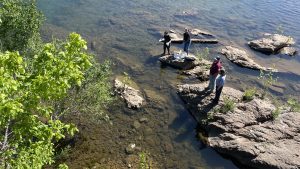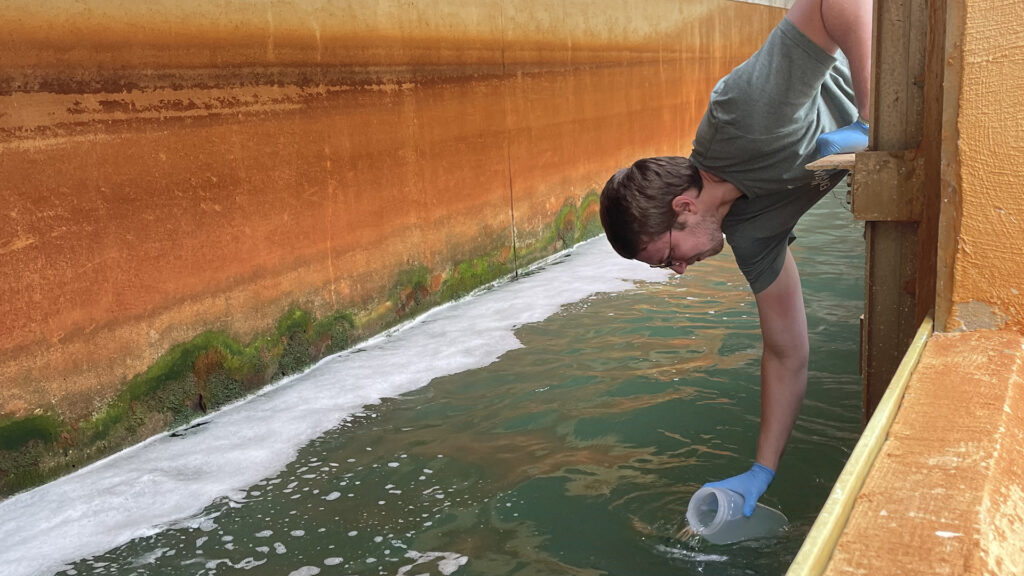Dr. Amy Pruden and her team, who conduct integrative research on antimicrobial resistance in wastewater, emphasize the One Health approach and the use of wastewater monitoring to link antibiotic prescribing to resistance genes.
Over the past year, Dr. Amy Pruden, Distinguished Professor of Civil and Environmental Engineering at Virginia Tech, and her colleagues have advanced important research frontiers to further clarify the environmental aspects of antimicrobial resistance (AMR). As highlighted by the World Health Organization’s (WHO) Global Program of Action and the United Nations Environment Programme’s report on combating superbugs, a One Health approach that considers the interconnected health of humans, animals and the environment is essential to combating the spread of AMR, but the environmental dimension is relatively poorly defined. On October 14, Pruden was invited to speak about this issue as a keynote speaker at the International One Health Symposium in Berlin, Germany.
Dr. Pruden highlighted her team’s research published last month in NPJ Antibiotics and Resistance¹. By partnering with medical researchers Dr. Lauren McDaniel, Dr. Jayasingha Rao, Dr. Elizabeth Nowak, and Dr. Anthony Baffour-Bonny from Carillion Clinic, which serves the southwestern US state of Virginia, they were able to obtain antibiotic prescribing data for the region and map the inpatient and outpatient prescribing rates per patient visit in two adjacent areas. Sewer shed.
They found that while outpatient prescription rates fell sharply during the early stages of the COVID-19 pandemic, some regions had significantly higher outpatient prescription rates during the 2017 to 2022 period examined in the study. They compared this data with longitudinal shotgun metagenomic sequencing data of sewage entering two corresponding wastewater treatment plants (WWTPs) and found that WWTPs serving communities with historically higher antibiotic prescribing rates had higher numbers and diversity of unique antibiotic resistance genes (ARGs).
This study has important implications for the benefits of improved antimicrobial management practices and provides an example of the value of wastewater-based surveillance in AMR monitoring at a regional scale.
Sampling campaign for antibiotic-resistant bacteria in water
Over the past six months, Pruden’s team has begun a long-term sampling campaign for antibiotic-resistant bacteria (ARBs) and ARGs in rivers throughout the eastern United States. Dr. Valerie J. Harwood’s team led sampling in Florida, Dr. Walid Alari led sampling in Tennessee, Dr. LaTanya Logan led sampling in Atlanta and Chicago, Dr. Emily Garner led sampling in West Virginia, and Dr. Peter Vikesland partnered with Pruden to conduct sampling throughout Virginia. The ARBs of interest are cefotaxime-resistant E. coli, vancomycin- and erythromycin-resistant Enterococcus, and ceftazidime- and imipenem-resistant Pseudomonas aeruginosa.
Analysis of the results is ongoing and will help identify the sources of these representative ESKAPEE pathogens to the environment, including the relative contribution of a range from small to large wastewater treatment plants. This study also provides an opportunity for comparison with clinical ARB strains and will help address gaps in epidemiological knowledge regarding the contribution of environmental exposures to human AMR infections.

Shotgun metagenomic sequencing and whole-genome sequencing will be further conducted to uncover the origin and evolution of resistance in these aquatic environments. This effort is also essential in taking steps toward standardization of culture-based methods for environmental monitoring of ESKAPEE pathogens, which is often difficult due to contamination with nonspecific microorganisms.
Future metagenomic sequencing research
In the coming months, Dr. Matthew Blair and his team at Pruden, Weikesland, and the University of Alabama will further analyze metagenomic sequence data collected from influent and effluent water from wastewater treatment plants in India, the Philippines, Botswana, Switzerland, Portugal, Sweden, and the United States. This study builds on recent studies that revealed striking patterns in the relative abundance and clinical relevance of ARGs in sewage as a function of geography2,3. This more detailed study provides an opportunity to investigate the drivers of these patterns, including socio-economic factors and the level of local and national policy and management efforts.
Improved accessibility
Finally, Pruden’s team worked with Dr. Liqing Zhang to develop a web-based tool to make metagenomic-based tools for monitoring ARGs in the environment more accessible. In August, her team launched CIWARS (Cyber Infrastructure for Waterborne Antimicrobial Resistance Surveillance) as a web server configured for long-term metagenomic data. Additionally, we made progress toward the use of large-scale language models in ARG identification via ProtAlignARG and the implementation of assembly graphs for mapping the local context of ARGs on mobile genetic elements and pathogens via ARGContextProfiler.
overcome challenges
One of the major obstacles to the progress of the research conducted by Pruden and his collaborators is the loss of U.S. Environmental Protection Agency (US EPA) funding, as previously reported by INN. This is due to the recent unfortunate decision by the U.S. Environmental Protection Agency to close its Office of Research and Development and terminate all funded research projects. This funding was essential to support national monitoring of ARBs and ARGs in rivers as a means to gain insight into the ecology and evolution of AMR and the contribution of environmental exposures to resistant infections encountered in the clinic.
Her team was able to move forward on a more modest scale with support from the National Science Foundation Research and Training (NRT) Doctoral Training Grant on Combating Antimicrobial Resistance, the Virginia Tech Fralin Institute for Life Sciences, the Virginia Tech College of Engineering, and other internal sources. Pruden emphasizes that investment in environmental AMR research is more important than ever, especially on an international scale, to better understand the root causes of the problem and identify effective strategies to ensure that antibiotics continue to serve as lifesaving medicines for future generations.
References
Maile Moskowitz, A; Brown, CL, Afrin Rumi, M; Moumi, N; Majeed, H; Finkielstein, C; Ceci, A; Gonzalez, R; Shea, K, McDaniel, L; Baffour-Bonnie, A; Rao, J; Zhang, L; Pruden, A; Weikesland, Pennsylvania Adjacent 2 Before and After the COVID-19 Pandemic Association between antimicrobial use and wastewater resistance gene patterns through metagenomic analysis of two treatment plants. NPJ Antimicrobials and Resistance. September 30, 2025. https://doi.org/10.1038/s44259-025-00153-9 https://pmc.ncbi.nlm.nih.gov/articles/PMC6408512/ https://pubs.acs.org/doi/10.1021/acs.est.1c08673
This article will also be published in the quarterly magazine issue 24.
Source link

